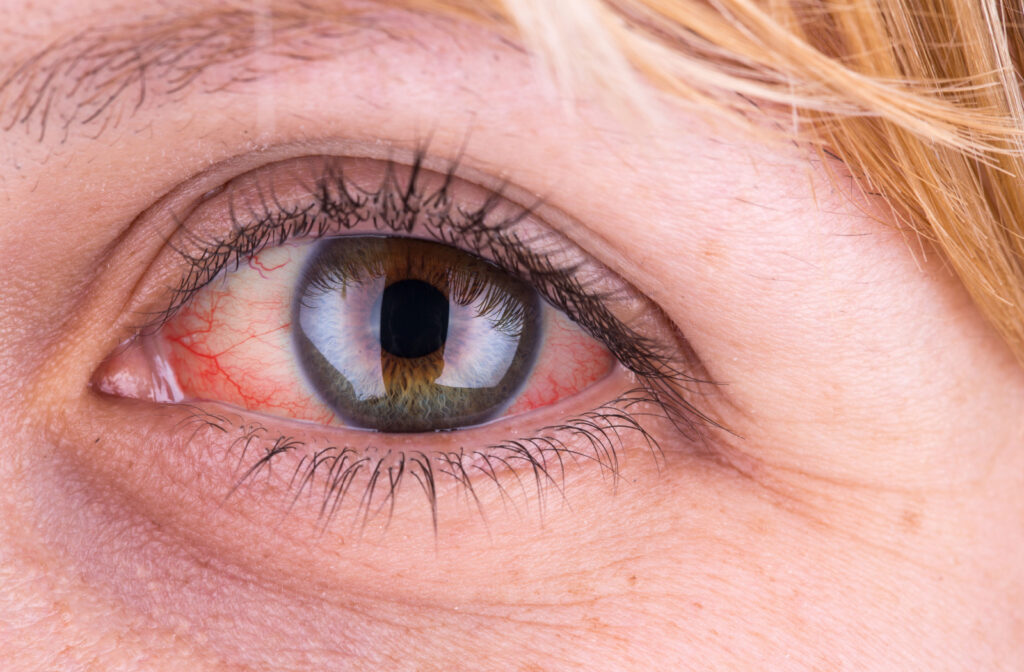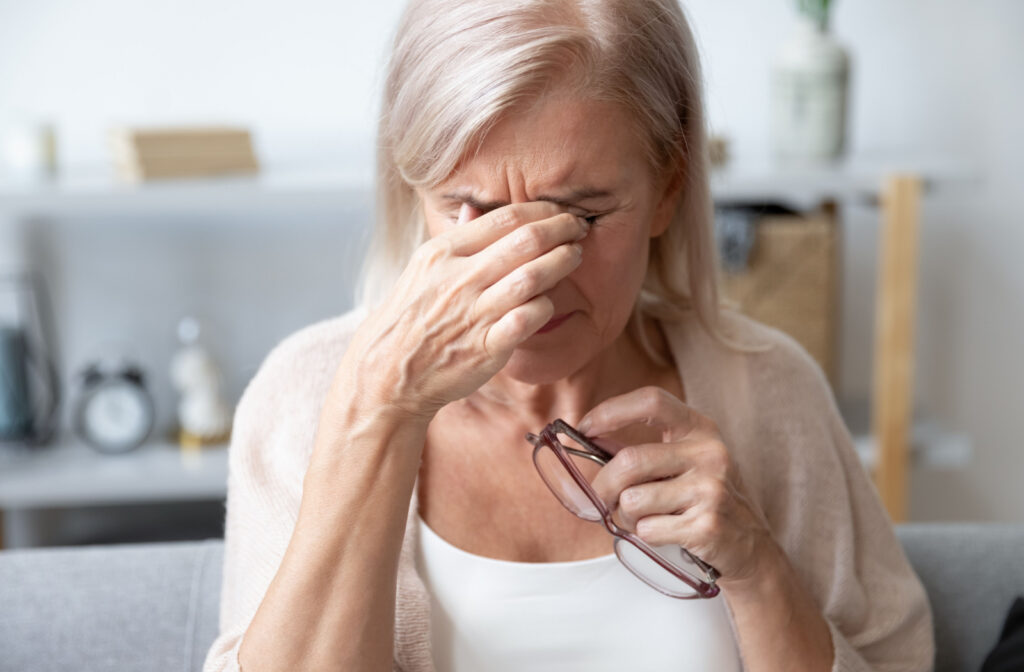Dry eye and cataracts are distinct eye conditions, but people can often have them at the same time, especially if they are older. Individuals who develop cataracts—a clouding of the normally transparent lens of the eye—may experience dry eyes, where the eyes do not maintain adequate lubrication. Cataract surgery can also worsen dry eye symptoms.
For these reasons, it’s important to have regular eye exams if you experience changes in your vision or have uncomfortable symptoms.
What Are Cataracts?
Cataracts are a natural age-related eye condition that occurs when the crystalline lens inside your eye becomes cloudy. They develop as the proteins in your eyes break down over time and clump together, causing the lens to become opaque, impeding light entering the eye and affecting the quality of vision. As a cataract gets worse, more of the lens becomes cloudy.
Cataracts can lead to decreased vision and can affect everyday tasks, making activities like driving at night and reading difficult. Symptoms of cataracts can include:
- Blurry vision
- Faded colors
- Double vision
- Glares and halos around lights
- Frequent glasses and contact lens prescription changes
What Is Dry Eye?

Dry eye is a common eye condition characterized by a lack of adequate lubrication in the eye—either you don’t produce enough tears or your tears evaporate too quickly. It can be caused by:
- Age: Your body produces fewer tears as you age.
- Environmental factors: Windy, smoky, or dry environments can lead to tear evaporation.
- Medical conditions: Some health conditions can cause dry eyes.
- Medications: The side effects of certain medications can cause dry eye.
- Lifestyle factors: A common symptom of digital eye strain is dry eye.
Depending on the severity, dry eye can significantly affect vision comfort and quality of life. Symptoms of dry eye can include:
- A gritty sensation in the eyes
- Eye redness
- A burning or stinging feeling in the eyes
- Sensitivity to light
- Blurry vision
Do Cataracts Cause Dry Eyes?
Cataracts and dry eyes can occur simultaneously. However, having cataracts isn’t a direct cause of dry eyes. Patients with cataracts may be more prone to notice symptoms of dry eyes because both conditions share common risk factors like aging.
After cataract surgery, some people develop dry eye, while others find their existing dry eye worsens. Factors that can lead to dry eyes after cataract surgery may include:
- Prolong use of antibiotic-steroid eye drops
- Decreased tear film break-up time
- Decreased mucin production
- Decreased corneal sensation
- Poor tear film production and stability
Myths & Facts About Cataracts
Separate fact from fiction about cataracts. Here are the myths you need to know.
Myth 1: Cataracts can spread from one eye to the other.
Fact: You can get cataracts in one or both eyes, but cataracts can’t spread from one eye to the other.
Myth 2: You can only get cataracts when you’re old.
Fact: Age is indeed a risk factor for cataracts—by age 80, most people have cataracts or have had cataract surgery. However, you can also get cataracts from an eye injury or eye surgery at any age.
Myth 3: Lifestyle factors can cure cataracts.
Fact: While adopting healthy lifestyle changes can help protect your eyes, they can’t cure or reverse cataracts. Cataract surgery is the only way to get rid of a cataract.
Dry Eye Treatments
Your eye doctor can diagnose and treat dry eyes with various dry eye treatments:
- Prescription eye drops for moderate to severe dry eyes
- Artificial tears with omega-3 for dry eye relief
- Hydrating heat masks to melt blockages in oil glands
- Lid scrubs that help clean blockages in oil glands
Managing Dry Eyes During Cataract Surgery
If you need cataract surgery, you might be concerned about developing or worsening dry eye. The good news is that dry eye symptoms after cataract surgery are often temporary.
If you have pre-existing dry eyes, your eye doctor can help manage your conditions with proper care and treatment, such as prescription eye drops before and after surgery. Using them as directed can help alleviate discomfort and promote healing after cataract surgery.
Achieving Healthy Eyes & Vision
While cataracts don’t cause dry eyes directly, both conditions can co-exist, especially as we age. Awareness and diagnosis of symptoms are vital in managing cataracts and dry eyes, especially if you need cataract surgery. Book an appointment with Vision Care Grayslake if you notice changes to your vision or symptoms such as blurry vision that affects your daily routine.




